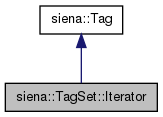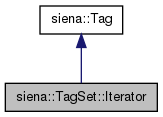iterator for a tag set. More...
#include <tags.h>
Inheritance diagram for siena::TagSet::Iterator:

Collaboration diagram for siena::TagSet::Iterator:

Public Member Functions | |
| virtual bool | next ()=0 |
| moves this iterator to the next tag in the set. More... | |
| virtual | ~Iterator () |
| iterator destructor. | |
 Public Member Functions inherited from siena::Tag Public Member Functions inherited from siena::Tag | |
| virtual | ~Tag () |
| virtual destructor. | |
| virtual std::string | to_string () const =0 |
| string value of this tag. More... | |
| virtual std::string & | to_string (std::string &) const =0 |
| string value of this tag. More... | |
Detailed Description
iterator for a tag set.
An iterator in a tag set represents a tag directly, in the sense that it is itself a tag reference, and it can also be switched to refer to the next tag in the set. The iteration order is implementation-dependent.
The following example shows how to iterate through a tag set:
#include <siena/tags.h>
//... implementation of the siena/tags objects
SimpleTagSet ts;
// ...
siena::TagSet::Iterator * i = ts.first();
if (i != 0) {
do {
std::cout << i->to_string() << std::endl;
} while(i->next());
delete(i);
}
Notice that iterators must be explicitly deallocated.
- Examples:
- simple_tags_types.cc, and simple_tags_types.h.
Member Function Documentation
|
pure virtual |
moves this iterator to the next tag in the set.
- Returns
- true if the element pointed to by this iterator before this call to next() is not the last tag in its tag set. In this case, after this call to next(), this iterator will point to the next tag.
- false if the element pointed to by this iterator before this call to next() is either the the last tag in its tag set, or an invalid tag. In this case, after this call to next(), this iterator will point to an invalid tag.